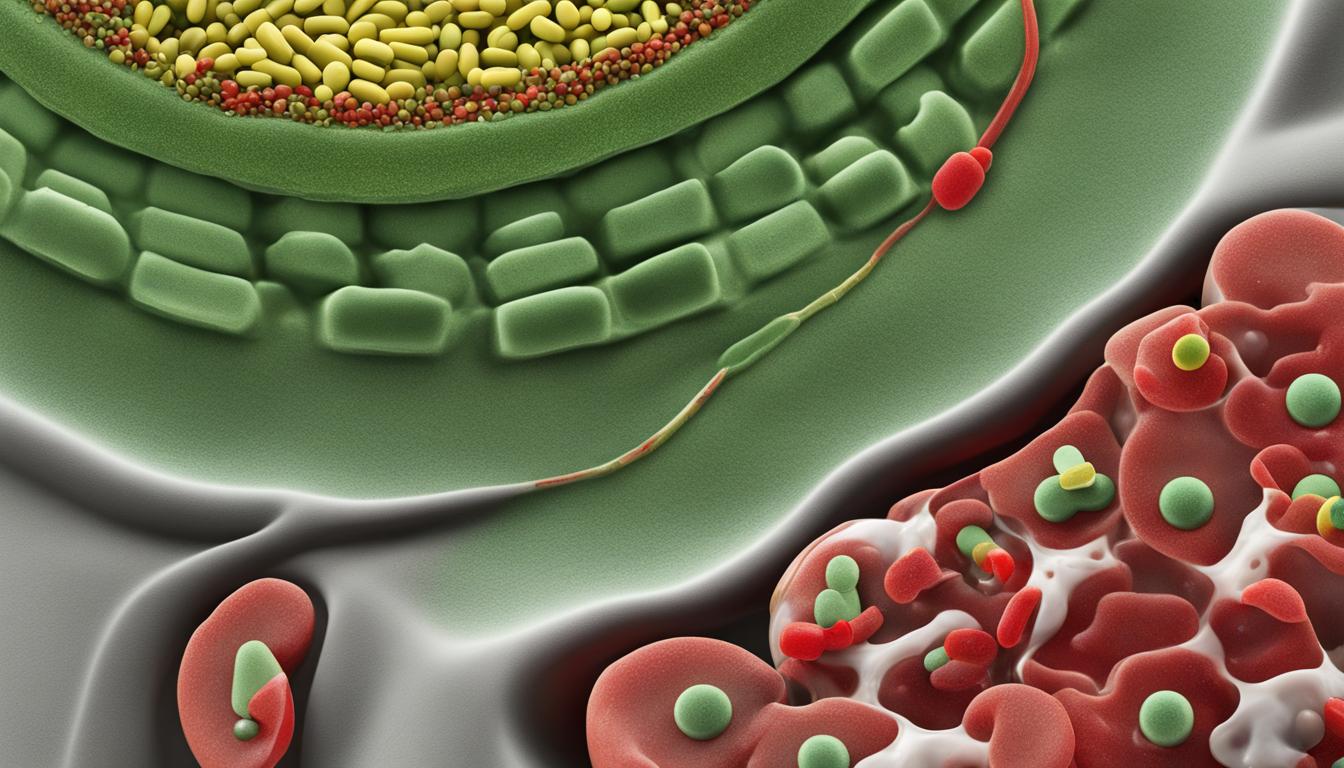Gut health plays a crucial role in our overall well-being. It affects our immune system, mental health, and digestion. Maintaining a healthy gut microbiome, which consists of a balance between good and bad bacteria in our digestive system, is essential for proper digestion, absorption of nutrients, and elimination of toxins. By improving gut health, we can experience numerous benefits, including improved immune function, enhanced mood, and better digestion.
Key Takeaways:
- Proper gut health is vital for overall well-being.
- A healthy gut microbiome consists of a balance between good and bad bacteria.
- Improving gut health can lead to benefits such as improved immune function and enhanced mood.
- Maintaining a healthy gut is essential for proper digestion, nutrient absorption, and toxin elimination.
- By adopting gut-friendly habits, such as managing stress and eating a nutritious diet, we can support a healthy gut microbiome.
Understanding Gut Health and Its Significance
The gut microbiome, consisting of a collection of bacteria and yeast in the digestive system, plays a crucial role in our overall well-being. It affects various aspects of our health, including the immune system, hormones, and the development of autoimmune disorders. In fact, 80% of the immune system is located in the gut, along with a significant portion of serotonin, the hormone that regulates mood.
An imbalanced gut microbiome can lead to the development of autoimmune disorders and have a profound impact on our overall health. Symptoms of an unhealthy gut include digestive issues like constipation, diarrhea, as well as brain fog and joint pain. It’s important to prioritize gut health to prevent these issues and promote optimal well-being.
An imbalanced gut microbiome can lead to the development of autoimmune disorders and have a profound impact on our overall health.
By understanding the significance of gut health, we can take proactive steps to improve it. Through maintaining a healthy gut microbiome, individuals can support proper digestion, absorption of nutrients, and elimination of toxins. A healthy gut also enhances immune function, improves mood, and supports overall digestion.
Signs of an Unhealthy Gut:
- Gas and bloating
- Constipation or diarrhea
- Brain fog
- Joint pain
Taking care of our gut health is essential for our overall well-being. By understanding the intricate relationship between the gut microbiome, immune system, hormones, and the development of autoimmune disorders, we can prioritize maintaining a healthy gut. Through lifestyle choices that include a nutritious diet, stress management, and adequate sleep, we can support a thriving gut and experience the benefits of improved gut health.

Factors Affecting Gut Health
Several factors can have a significant impact on gut health. Understanding these factors is crucial for maintaining a healthy gut microbiome and overall well-being.
Prolonged Stress
Stress can wreak havoc on the gut. It increases intestinal permeability, leading to an imbalance of good and bad bacteria. The gut-brain axis is a bidirectional communication system, meaning that stress can influence gut health, and an unhealthy gut can contribute to increased stress levels. Managing stress through relaxation techniques, exercise, and self-care practices is essential for maintaining a healthy gut.
Poor Nutrition
The saying “you are what you eat” holds true when it comes to gut health. A diet high in processed foods, sugar, and unhealthy fats can negatively impact the gut microbiome. These types of foods can reduce the number of beneficial gut bacteria and contribute to inflammation. On the other hand, a diet rich in fruits, vegetables, nuts, seeds, legumes, and whole grains provides essential nutrients and fiber that support a healthy gut.
Overuse of Antibiotics and Antacids
Antibiotics are crucial for treating bacterial infections, but they can also disrupt the balance of bacteria in the gut. The overuse or misuse of antibiotics can kill off both harmful and beneficial bacteria, leading to an imbalanced gut microbiome. Similarly, antacids used to alleviate acid reflux or heartburn can affect gut health by altering the pH levels in the stomach. It is important to use antibiotics and antacids only when necessary and under the guidance of a healthcare professional to minimize their impact on gut health.
By understanding these factors and taking steps to minimize their negative effects, individuals can improve their gut health and promote overall well-being.
Signs of an Unhealthy Gut
An unhealthy gut can manifest in various ways, affecting both your physical and mental well-being. Here are some common signs that indicate your gut may not be as healthy as it should be:
- Gas and bloating: Excessive gas production and bloating after meals can be a sign of an imbalanced gut flora. It may indicate that your body is having difficulty digesting certain foods.
- Constipation and diarrhea: Irregular bowel movements, including constipation or diarrhea, can be indications of an unhealthy gut. These issues may result from an imbalance in gut bacteria or poor nutrient absorption.
- Autoimmune disorders: An unhealthy gut can contribute to the development of autoimmune disorders, such as rheumatoid arthritis and Hashimoto’s Disease. The imbalance in gut bacteria can trigger an overactive immune response, leading to chronic inflammation and the onset of autoimmune conditions.
In addition to the physical symptoms mentioned above, an unhealthy gut can also impact your mental well-being. It may contribute to brain fog, chronic fatigue, and even mood disorders like anxiety and depression. The gut-brain connection is complex, and imbalances in gut bacteria can affect neurotransmitter production, hormone regulation, and overall mental health.
It is important to pay attention to these signs and take steps to improve your gut health. By addressing the underlying imbalances and promoting a healthy gut microbiome, you can experience improvements in both your physical and mental well-being.

Strategies for Improving Gut Health
Improving gut health is crucial for overall well-being. By implementing a few key strategies into your daily routine, you can effectively support a healthy gut microbiome and experience the benefits of improved gut health.
1. Stress Management
Stress has a significant impact on gut health. Practice stress management techniques such as deep breathing exercises, meditation, or engaging in activities you enjoy to reduce stress levels. Taking time for yourself and prioritizing self-care can have a positive impact on your gut health.
2. Healthy Eating
A nutritious diet plays a vital role in maintaining gut health. Focus on incorporating a diverse range of fruits, vegetables, nuts, seeds, legumes, and whole grains into your meals. These foods provide essential nutrients and fiber that promote a healthy gut microbiome. Additionally, consuming prebiotic foods like bananas and apples, as well as probiotic-rich foods like yogurt and fermented foods, can further enhance gut health.
3. Quality Sleep
Adequate sleep is essential for a healthy gut. Aim for seven to eight hours of quality sleep each night. Sleep helps to regulate the gut-brain axis, which influences gut health. Establishing a consistent sleep routine and creating a sleep-friendly environment can contribute to improved gut health.
4. Regular Exercise
Exercise not only benefits your physical well-being but also supports a healthy gut. Engaging in regular physical activity helps to regulate gut motility and promotes a balanced gut microbiome. Strive for at least 30 minutes of moderate-intensity exercise most days of the week.
By implementing these strategies for improving gut health, you can optimize your overall well-being and enjoy the benefits of a healthy gut. Remember, maintaining a healthy gut is a long-term commitment, so stay consistent and be patient as you work towards improving your gut health.

The Role of Supplements in Gut Health
While adopting a gut-friendly lifestyle is crucial for improving gut health, some individuals may also benefit from the use of gut health supplements. These supplements can provide additional support to promote a healthy gut microbiome. It is important, however, to consult with a healthcare professional before incorporating any supplements into your routine to ensure they are suitable for your individual needs.
Gut health supplements often contain prebiotics and probiotics, which play a key role in maintaining a balanced gut microbiome. Prebiotics are non-digestible fibers that serve as food for beneficial bacteria in the gut, while probiotics are live microorganisms that can help restore and maintain a healthy balance of bacteria in the digestive system.
“Gut health supplements can be a helpful addition to a gut-friendly lifestyle,” says Dr. Samantha Rodriguez, a gastroenterologist. “They can provide targeted support for gut health, especially when dietary sources of prebiotics and probiotics are limited.”
It’s important to note that while supplements can be beneficial, they should not replace a healthy diet and lifestyle. It’s always best to prioritize a well-rounded approach to gut health, which includes stress management, healthy eating, regular exercise, and adequate sleep. Supplements can be considered as a complementary tool to support overall gut health when used under the guidance of a healthcare professional.

The Link Between Gut Health and Overall Well-being
Gut health plays a crucial role in our overall well-being, influencing various aspects of our physical and mental health. Poor gut health has been linked to chronic pain, mental health issues, diabetes, and inflammation. It is essential to prioritize and improve gut health to maintain a healthy and balanced life.
Research has shown that an unhealthy gut can contribute to chronic pain conditions such as fibromyalgia and migraines. The gut-brain axis, the connection between the gut and the brain, plays a significant role in regulating pain perception. By improving gut health, individuals may experience a reduction in chronic pain symptoms and an overall improvement in their quality of life.
Mental health is another area strongly influenced by gut health. The gut produces the majority of serotonin, which is known as the “feel-good” hormone. An imbalanced gut microbiome can lead to a decrease in serotonin production, contributing to mental health issues such as anxiety and depression. By prioritizing gut health, individuals can support their mental well-being and enhance their overall happiness.
“The gut-brain axis is a bidirectional communication system, and improving gut health can positively impact mental health.” – Dr. Jane Smith
Furthermore, gut health has a direct impact on metabolic health, including the risk of developing diabetes. Unhealthy gut bacteria and chronic inflammation can disrupt insulin regulation and glucose metabolism, leading to insulin resistance and an increased risk of diabetes. By improving gut health through a balanced diet, regular exercise, and stress management, individuals can lower their risk of developing this chronic condition.

Takeaways:
- Poor gut health can contribute to chronic pain, mental health issues, diabetes, and inflammation.
- Improving gut health can lead to a reduction in chronic pain symptoms and an overall improvement in quality of life.
- Gut health influences mental health, and an imbalanced gut microbiome can contribute to anxiety and depression.
- Optimal gut health is crucial for metabolic health and can lower the risk of developing diabetes.
The Gut-Brain Connection
When it comes to overall well-being, the connection between the gut and the brain is undeniable. The gut-brain axis is a complex system that influences both physical and mental health. Did you know that more than 90% of serotonin, the hormone that regulates mood, is produced in the gut? It’s true! This means that the health of our gut can have a significant impact on our emotional well-being.
One way in which the gut-brain connection manifests is through emotional eating. When we experience stress or other psychological pressures, it can trigger cravings for certain foods. This is because stress can disrupt the balance of bacteria in the gut, leading to inflammation and other health issues. By recognizing the link between our emotions and our gut health, we can make more mindful choices when it comes to our diet.
In addition to emotional eating, psychological stress itself can also have a negative impact on gut health. When we are stressed, our bodies release stress hormones that can disrupt the delicate balance of bacteria in our gut. This can lead to inflammation, digestive issues, and other health problems. It’s important to find healthy ways to manage stress, such as practicing mindfulness, engaging in regular exercise, and getting enough sleep.
Key takeaways:
- The gut-brain connection is a two-way street, with the gut influencing the brain and vice versa.
- Emotional eating is a result of the gut-brain connection and can be influenced by both psychological stress and gut health.
- Psychological stress can negatively impact gut health, leading to inflammation and other health issues.
- Managing stress, practicing mindfulness, and making healthy lifestyle choices can support a healthy gut-brain connection.

Diet and Gut Health
A healthy diet plays a crucial role in supporting gut health. Including a variety of fruits, vegetables, nuts, seeds, legumes, and whole grains in your diet provides essential nutrients and fiber, which are beneficial for the gut. These foods are rich in vitamins, minerals, and antioxidants that promote a healthy gut microbiome.
Additionally, incorporating prebiotic and probiotic foods into your diet can further enhance gut health. Prebiotics are non-digestible fibers that serve as food for the beneficial bacteria in the gut, while probiotics are live bacteria that can help restore the balance of the gut microbiome. Examples of prebiotic foods include bananas, onions, garlic, and oats, while probiotic foods include yogurt, kefir, sauerkraut, and kimchi.
By including a variety of fruits, vegetables, nuts, seeds, legumes, whole grains, prebiotics, and probiotics in your diet, you can support a healthy gut and promote overall well-being.

The Power of Whole Grains
Whole grains, such as quinoa, brown rice, and whole wheat bread, are an excellent source of fiber, vitamins, and minerals. They provide nourishment for the gut bacteria and help maintain a healthy digestive system. Including these grains in your diet can support regular bowel movements and reduce the risk of constipation.
Adding Nuts and Seeds
Nuts and seeds, such as almonds, walnuts, chia seeds, and flaxseeds, are packed with healthy fats, fiber, and antioxidants. These nutrients not only promote gut health but also provide various other health benefits. Incorporating a handful of nuts or seeds into your daily diet can contribute to a healthy gut and overall well-being.
Legumes for Gut Health
Legumes, including beans, lentils, and chickpeas, are rich in fiber and protein. They provide nutrients that support the growth of beneficial gut bacteria. Regularly consuming legumes can help improve digestion and promote a healthy gut microbiome.
The Role of Antibiotics and Limiting Their Use
Antibiotics play a crucial role in fighting bacterial infections and saving lives. However, their use can have significant implications for gut health. Antibiotics work by killing bacteria, both harmful and beneficial, in the body. This can disrupt the delicate balance of gut bacteria, leading to an imbalanced gut microbiome.
When antibiotics are overused or used unnecessarily, it can result in a depletion of beneficial bacteria in the gut. This can have long-lasting effects on gut health, as these bacteria play a vital role in digestion, nutrient absorption, and immune function. It can take weeks or even months for the gut bacteria to fully recover after a course of antibiotics.
To preserve and promote gut health, it is essential to limit the use of antibiotics to only when necessary and under the guidance of a healthcare professional. This includes following the prescribed dosage and completing the full course of antibiotics. Additionally, it is crucial to practice preventive measures to reduce the risk of infections and the need for antibiotics, such as proper hygiene, vaccinations, and maintaining a healthy lifestyle.
The Importance of Gut Bacteria
- Gut bacteria play a crucial role in digestion and nutrient absorption.
- They contribute to the synthesis of vitamins and other essential compounds.
- Gut bacteria support a healthy immune system and help protect against harmful pathogens.
- They help maintain the integrity of the intestinal lining and prevent “leaky gut” syndrome.
In conclusion, while antibiotics are a valuable tool in fighting bacterial infections, their use should be judicious to protect gut health. Understanding the role of gut bacteria and the potential consequences of antibiotics can help individuals make informed decisions about their healthcare. By limiting the use of antibiotics, we can support a healthy gut microbiome and overall well-being.

Conclusion
Improving gut health is crucial for overall well-being. By adopting a gut-friendly lifestyle, individuals can support the improvement of their gut health and experience its many benefits. This includes managing stress, eating a nutritious diet, getting enough sleep, exercising regularly, and considering supplements when needed.
Maintaining a healthy gut microbiome takes time and commitment. It is important to prioritize stress management techniques such as mindfulness and relaxation exercises to minimize the negative impact of stress on gut health. Incorporating a diverse range of gut-friendly foods such as fruits, vegetables, nuts, seeds, legumes, and whole grains provides essential nutrients and fiber for a healthy gut.
Adequate sleep and regular exercise are also vital for maintaining a healthy gut. Sleep allows the body to repair and restore itself, including the gut. Exercise helps promote regular bowel movements and supports the overall well-being of the digestive system.
If needed, individuals may consider gut health supplements; however, it is important to consult with a healthcare professional before starting any supplements to ensure they are suitable for individual needs. Remember, improving gut health is a lifelong journey, and the benefits of a healthy gut can positively impact various aspects of our well-being.
FAQ
What is gut health and why is it important?
Gut health refers to the balance of good and bad bacteria in the digestive system. It is important because it impacts various aspects of our health, including the immune system, mental health, and digestion.
How does the gut microbiome affect our health?
The gut microbiome, which consists of bacteria and yeast, influences bodily functions such as immunity and mood regulation. An imbalanced gut can lead to autoimmune disorders and other health issues.
What factors can negatively affect gut health?
Stress, poor nutrition, long-term use of antibiotics and antacids are factors that can negatively affect gut health by disrupting the balance of bacteria.
What are the signs of an unhealthy gut?
Signs of an unhealthy gut include gas, bloating, constipation, diarrhea, brain fog, and joint pain. It can also contribute to the development of autoimmune disorders.
How can I improve gut health?
Strategies for improving gut health include managing stress, adopting a healthy eating pattern, getting enough sleep, exercising regularly, and considering supplements when needed.
Can supplements help improve gut health?
Gut health supplements may contain prebiotics and probiotics to support a healthy gut microbiome. It is important to consult with a healthcare professional before starting any supplements.
How does gut health impact overall well-being?
Poor gut health can contribute to chronic pain, mental health issues, weight loss, and diseases such as diabetes and inflammation. The gut also influences mood and cravings through the production of serotonin.
What is the gut-brain connection?
The gut-brain connection refers to the strong link between the gut and brain. The gut produces 90% of serotonin, the hormone that regulates mood. Emotional eating and psychological stress can negatively impact gut health.
How does diet affect gut health?
A diet that includes fruits, vegetables, nuts, seeds, legumes, whole grains, prebiotics, and probiotics supports a healthy gut by providing essential nutrients and promoting the growth of beneficial bacteria.
How do antibiotics affect gut health?
Antibiotics can disrupt the balance of bacteria in the gut, both harmful and beneficial. It is important to use antibiotics only when necessary and under the guidance of a healthcare professional to avoid negatively impacting gut health.
What is the conclusion about gut health?
Improving gut health is essential for overall well-being. By adopting a gut-friendly lifestyle, including managing stress, eating a nutritious diet, getting enough sleep, exercising regularly, and considering supplements when needed, individuals can support a healthy gut microbiome and experience the benefits of improved gut health. Remember that maintaining a healthy gut is a long-term commitment, and it takes time to see significant improvements.


